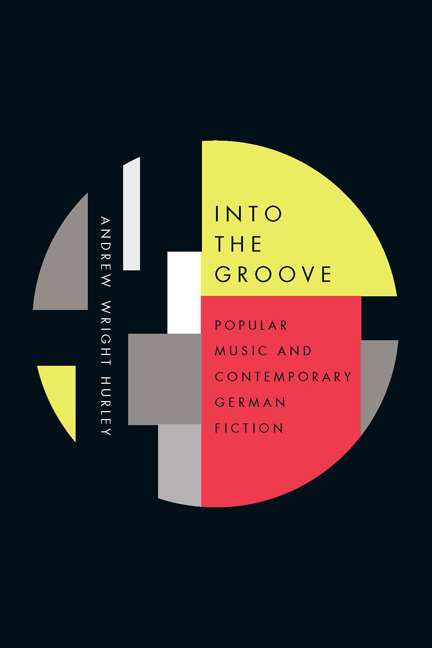Book contents
- Frontmatter
- Dedication
- Contents
- Acknowledgments
- Introduction
- 1 Preludes and Returns: Popular Music, the ʿ68 Generation, and the Literarization of the Jukebox
- 2 Enter the Double Agent: The German Popular Musician as Novelist
- 3 Techno-Lit: Electronica and Its Impacts on Fiction
- 4 Analogue is Better: Rock- and Pop-centric Literature
- 5 After the GDR's “Musical Niche Society”? Popular Music in the Literature of Thomas Brussig
- 6 The Gendering of Popular Music in the Novels of Karen Duve and Kerstin Grether
- Conclusion: Out of the Groove?
- Bibliography
- Index
1 - Preludes and Returns: Popular Music, the ʿ68 Generation, and the Literarization of the Jukebox
Published online by Cambridge University Press: 05 May 2015
- Frontmatter
- Dedication
- Contents
- Acknowledgments
- Introduction
- 1 Preludes and Returns: Popular Music, the ʿ68 Generation, and the Literarization of the Jukebox
- 2 Enter the Double Agent: The German Popular Musician as Novelist
- 3 Techno-Lit: Electronica and Its Impacts on Fiction
- 4 Analogue is Better: Rock- and Pop-centric Literature
- 5 After the GDR's “Musical Niche Society”? Popular Music in the Literature of Thomas Brussig
- 6 The Gendering of Popular Music in the Novels of Karen Duve and Kerstin Grether
- Conclusion: Out of the Groove?
- Bibliography
- Index
Summary
After establishing the increasingly important yet contested relationship between members of the ʿ68 generation and Anglo-American popular music during the late 1960s, this chapter will consider two different literary engagements with the key technology of the jukebox. I have selected Rolf Dieter Brinkmann's Wurlitzer (1966) and Peter Handke's The Jukebox (1990) for several reasons. Both authors are significant figures within the pop-musicalization of literature during what scholars in the 1990s and subsequently called “Pop I,” that is, the first flush of socalled Popliteratur. Both were performance-aware writers during the late 1960s. They give us an opportunity to look back on some salient elements of that earlier phase of literary pop-musicalization. Wurlitzer reflected the rise in importance of popular music consumption among young Germans during the 1960s, as well as the recognition that the jukebox possessed special qualities and that technologies like it might be as important as the music they played. Brinkmann gave the jukebox a literary existence, and straddled the opposite poles of critique and affirmation during its zenith as a technology. The Jukebox is significant because it postdates Wurlitzer and Pop I by two decades, and marks a return of sorts to that earlier phase. Handke reengaged with the analogue jukebox on the eve of its demise and, adopting a cooler tone than Brinkmann, reflected on the memories and affects that might still reside in the vestiges of an antiquated technology. The Jukebox is also significant because it slightly predates the flood of musico-centric literature during so-called Pop II. It offers a useful touchstone, both thematically and aesthetically, for some of the musico-centric literature that followed. The Jukebox not only establishes the key theme of popular music and memory. Like Wurlitzer, it also prefigures the ways in which later writers would attempt to functionalize music technologies and media as a source of literary form.
- Type
- Chapter
- Information
- Into the Groove?Popular Music and Contemporary German Fiction, pp. 21 - 48Publisher: Boydell & BrewerPrint publication year: 2015



